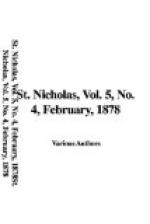Very good; and what are people who write books called? Then Mr. Ralph Waldo Emerson is an author. He lives in a republican country which has Washington for its capital. He was born in the Bay State, in the largest city of New England. He dwells now in a little town where a battle was fought a hundred years ago, and the name of this town means “harmony.” You know where that is, do you not? He was born in 1803, and, as this is 1878, every one of you boys and girls who can subtract can tell just his age. One of the books he has written tells about England, another about such famous men as Shakspeare and Napoleon, and others talk about wealth and friendship, prudence and power.
That does not sound as if he meant them for you? Well, one thing he did mean for you, and that is a dear little poem—“The Squirrel and the Mountain.” Every one of you will want to read it, and when you have read it you will want to learn it, and when you have learned you will want to speak it. I need not have told you he meant that poem for you; you would know that the minute you saw it. But you could not tell so soon how many things he says for you in those famous essays so often quoted. What do you think I can find for you in this dry-looking book, “Conduct of Life,” with “Emerson” printed just under the title?
Did you ever see an old hen with her little walking bundles of feathers in the soft garden soil? How she does scratch and bustle for something to eat! Why, she is eating every bit herself! Perhaps she thinks that taking care of the chickens’ mother is very important work for her; but by-and-by she will call the little folks to share what she has found.
You may think of me as of an old hen who has long been scratching in the soft garden soil of Ralph Waldo Emerson’s writings. She has found much for herself, with now and then a bit for the chickens.
Here, the very first thing, is something about eggs. “There is always a best way of doing everything, if it be but to boil an egg.” I hope my little friends are never cross when Bridget has not boiled the nice breakfast egg in the best way. More than that; I hope they themselves know what is the best way of doing it; just how hot the water must be, how long the egg should boil to make it hard or soft, and, what is well worth knowing, how to get it in and out of the hot water without breaking the shell.
Here is another bit. It is like an egg, for the meaning is wrapt in words just as an egg hides in the shell. “The tell-tale body is all tongues.” What does the tongue help to do? Will no one know that you are cross unless you say, “I am cross this morning?” Can I find it out although you do not say a word? Yes, indeed; that puckered mouth and ugly little scowl tell, all too quickly, and even if I could not see your face, that little jerk and twist would tell the story. Do you not know when the dog is sick or tired, or full of fun? yet, his bright eyes, eager little nose, lively body and whisking tail, tell no more surely than your own face and body.




